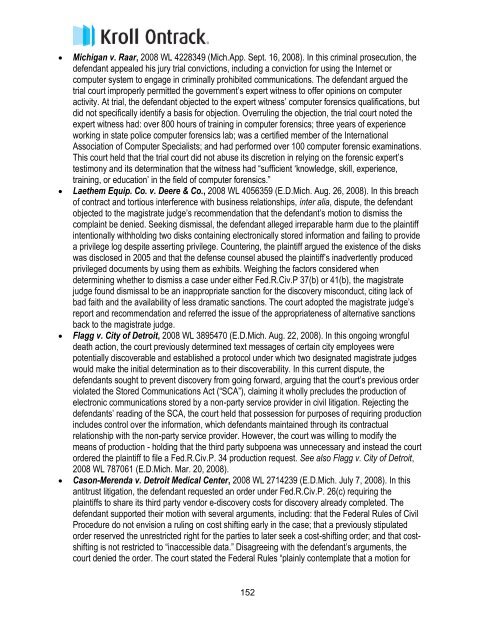Electronic Discovery and Computer Forensics Case List - Kroll Ontrack
Electronic Discovery and Computer Forensics Case List - Kroll Ontrack
Electronic Discovery and Computer Forensics Case List - Kroll Ontrack
You also want an ePaper? Increase the reach of your titles
YUMPU automatically turns print PDFs into web optimized ePapers that Google loves.
� Michigan v. Raar, 2008 WL 4228349 (Mich.App. Sept. 16, 2008). In this criminal prosecution, the<br />
defendant appealed his jury trial convictions, including a conviction for using the Internet or<br />
computer system to engage in criminally prohibited communications. The defendant argued the<br />
trial court improperly permitted the government’s expert witness to offer opinions on computer<br />
activity. At trial, the defendant objected to the expert witness’ computer forensics qualifications, but<br />
did not specifically identify a basis for objection. Overruling the objection, the trial court noted the<br />
expert witness had: over 800 hours of training in computer forensics; three years of experience<br />
working in state police computer forensics lab; was a certified member of the International<br />
Association of <strong>Computer</strong> Specialists; <strong>and</strong> had performed over 100 computer forensic examinations.<br />
This court held that the trial court did not abuse its discretion in relying on the forensic expert’s<br />
testimony <strong>and</strong> its determination that the witness had “sufficient ‘knowledge, skill, experience,<br />
training, or education’ in the field of computer forensics.”<br />
� Laethem Equip. Co. v. Deere & Co., 2008 WL 4056359 (E.D.Mich. Aug. 26, 2008). In this breach<br />
of contract <strong>and</strong> tortious interference with business relationships, inter alia, dispute, the defendant<br />
objected to the magistrate judge’s recommendation that the defendant’s motion to dismiss the<br />
complaint be denied. Seeking dismissal, the defendant alleged irreparable harm due to the plaintiff<br />
intentionally withholding two disks containing electronically stored information <strong>and</strong> failing to provide<br />
a privilege log despite asserting privilege. Countering, the plaintiff argued the existence of the disks<br />
was disclosed in 2005 <strong>and</strong> that the defense counsel abused the plaintiff’s inadvertently produced<br />
privileged documents by using them as exhibits. Weighing the factors considered when<br />
determining whether to dismiss a case under either Fed.R.Civ.P 37(b) or 41(b), the magistrate<br />
judge found dismissal to be an inappropriate sanction for the discovery misconduct, citing lack of<br />
bad faith <strong>and</strong> the availability of less dramatic sanctions. The court adopted the magistrate judge’s<br />
report <strong>and</strong> recommendation <strong>and</strong> referred the issue of the appropriateness of alternative sanctions<br />
back to the magistrate judge.<br />
� Flagg v. City of Detroit, 2008 WL 3895470 (E.D.Mich. Aug. 22, 2008). In this ongoing wrongful<br />
death action, the court previously determined text messages of certain city employees were<br />
potentially discoverable <strong>and</strong> established a protocol under which two designated magistrate judges<br />
would make the initial determination as to their discoverability. In this current dispute, the<br />
defendants sought to prevent discovery from going forward, arguing that the court’s previous order<br />
violated the Stored Communications Act (“SCA”), claiming it wholly precludes the production of<br />
electronic communications stored by a non-party service provider in civil litigation. Rejecting the<br />
defendants’ reading of the SCA, the court held that possession for purposes of requiring production<br />
includes control over the information, which defendants maintained through its contractual<br />
relationship with the non-party service provider. However, the court was willing to modify the<br />
means of production - holding that the third party subpoena was unnecessary <strong>and</strong> instead the court<br />
ordered the plaintiff to file a Fed.R.Civ.P. 34 production request. See also Flagg v. City of Detroit,<br />
2008 WL 787061 (E.D.Mich. Mar. 20, 2008).<br />
� Cason-Merenda v. Detroit Medical Center, 2008 WL 2714239 (E.D.Mich. July 7, 2008). In this<br />
antitrust litigation, the defendant requested an order under Fed.R.Civ.P. 26(c) requiring the<br />
plaintiffs to share its third party vendor e-discovery costs for discovery already completed. The<br />
defendant supported their motion with several arguments, including: that the Federal Rules of Civil<br />
Procedure do not envision a ruling on cost shifting early in the case; that a previously stipulated<br />
order reserved the unrestricted right for the parties to later seek a cost-shifting order; <strong>and</strong> that costshifting<br />
is not restricted to “inaccessible data.” Disagreeing with the defendant’s arguments, the<br />
court denied the order. The court stated the Federal Rules “plainly contemplate that a motion for<br />
152

















